It’s been a while since our last interview feature, but I can promise you, it’s been well worth the wait. Recently, we had the opportunity to sit down with Eric K. Barnum, a kindred spirit in some ways who has walked a very similar path with his fantasy series.
You’ve likely seen our big push for the first book in his Forsaken Isles collection, Dar Tania. Today, you get to see what we talked about, what makes Barnum tick, and understand just what makes his series so ridiculously appealing.
Tellest: Welcome to the interview. It’s great to have you here. We’ll start you off with one of the questions that I ask all our interviewees, because I think it’s always such a fun discovery for fans and readers. What inspired you to start writing?
Eric K Barnum: I have an analytic mind; it’s my professional career at the moment. When I found myself analyzing books, movies, comics, and games in light of this idea for a novel, world and universe, I realized it was time to start writing. I wanted to tell a story where magic and gods made balanced sense. The confusion between what is magic versus divine is something I address as a core theme in all my writing.
T: Surely you’ve had some works and authors that helped to inspire you along the way. Do you have anyone you’d be able to specifically reference as an influence?
EB: About 10 years ago, I decided to find and read as many of the “old stories” as I could get my hands on. Gilgamesh, Beowulf, Grendel, Cantebury Tales, Diary of Genji, Art of War, Bhagavad Gita, Way of the Pilgrim, Apocrypha, both religious and enduring stories. A common theme, for me at least, was a story of balance between the divine and our world… that then gets thrown off somehow. Contrasting this to the high fantasy genre where the hero and main characters are either out of balance or trying to restore balance, I realized that if you interject “magic” – or in scifi “tech” – into those same stories, they kind of fall apart. Gilgamesh and Enkidu just aren’t the same story if, when they go to Upanishaptim/Noah (of Noah’s Ark), they get magic. That whole story wouldn’t exist with magic. So, how do you balance them? I started making notes and jotting thoughts down from the stories I had read. Not critique, but if from this lens of magic being out of balance, is the story still epic? The Forsaken Isles started taking shape.
T: The Forsaken Isles world that you’ve built has a huge focus on magic, religions, and of course dragons. How did you manage to keep track of everything? Do you have a Forsaken Isles bible you made for yourself?
EB: I do. It’s a collection of now-ratty notebooks with handwritten and printed notes, sketches, and spreadsheets. Tolkien’s Silmarillion really drove it home to me that organization of stories, characters, and places is key to a great tale. I also have pictures from various Dragon magazines cut out and taped into various parts of my notebooks for fun too.
T: The Silmarillion eventually found its way into the hands of the people. Martin’s got the World of Ice and Fire. Do you think as your world and the stories therein continue to grow, people might see a fleshed out version of those notebooks to help understand just how vast everything is?
EB: In the 1980s, Marvel Comics released this campy series around an evil book called the Darkhold. Characters would interact with it, get magic, and clash with the superheroes. It was goofy fun. What you’re asking, I think of as my Darkhold Project. Much the same way you have Tellest, I plan on eventually releasing “The Darkhold Project”, which will be a story of the multiverse incorporating notes, but told from the perspective of souls trapped in the Darkhold. Bomoki’s Gate introduces the Darkhold where it is used to try and determine why Bomoki wants a certain objective. In my next book, Syliri & Bruce, the Darkhold is introduced in more detail. It’s a book that is also the middle realm of the Abyss. Rather than being a demon lord, like Lolth or Orcus, it’s a sentient book that influences and participates in the world through the pages of itself. It knows things through soul capture. As it finds something new and different, it manipulates its readers to the soul it next wants by sharing fragmented bits and pieces of knowledge. It’ll have awesome artwork where my sketches, like this one, will be fantastic. I do sketches like this for all combat scenes in my writing.
T: Your books have some familiarity with the Forgotten Realms books that a lot of fantasy readers have grown up with. At the same time though, Dar Tania and the subsequent stories invoke a breath of fresh air in the genre. How did you toe the line between something that’s been established in writing before and a brand new, powerful story?
EB: To the extent that my stories are about clerics and paladins in a dragon-based religion, I can see that. The similarity ends there. The Dragonlance Chronicles and War of the Twins are some of my favorite books. How did Raistlin become so evil? Yet, even when reading these, the interaction of magic and the gods felt weird to me. Hickman and Weiss were probably too bound to 2nd Edition Dungeons and Dragons rules on the heels of TSR’s Deities and Demigods publication. It’s the story of a mortal mage, Raistlin, who opposes an evil god, from whom he seems to derive his magical powers. Magic is either presented as a limitation to being a god, or somehow not accessible to its worshippers. In a world with non-godly magic, what does anyone—god or mortal—get out of worship? Is it really just healing, as The Forgotten Realms suggest? Why wouldn’t everyone just worship and practice Magic?
I also explore the paladin archetype in depth and it is unique. The archetypal characters of mages, fighters, etc. are familiar to all high and dark fantasy. The inclusion of dragons as a key element and the way they interact with the world can be explored on my blog at darmalcor.weebly.com or through the stories themselves. Like angels serving a goodly god, dragons worship and serve their own gods and their own agendas. There are micro and macro-scale battles of peoples, ideas, and religions. The Isles are Forsaken not because they needed a name, but because they are populated by refugees from the ancient empire of Merakor, which fell to the dark elves during a nexal inversion. The refugees forsook Merakor for the isles.
A nexus is a concept different in my world. They serve as travel points between planes in the multiverse. The world of the Forsaken Isles is in the center of the nexuses of Creation/Good, Chaos/Abyss, and Warp/Evil. When thing happen, like the dark elves wiping out the good empire of Merakor, it actually moves the entire world closer to the nexus of Chaos. This creates a cascade of destruction, cataclysm, and change. Similar things can happen if the world moves closer to Creation or Warp with the results you’d expect. Time flows because of these nexuses interacting with the world.
T: Speaking of the flow of time, Dar Tania, Malcor’s Story and Bomoki’s Gate all came out within a short amount of time and the latter two are fairly expansive. Can readers expect to continue seeing your books release at an accelerated pace like this?
EB: Yes. My fan reactions and reviews on Amazon have suggested that there might be more appetite for the 100 page books. I personally prefer large books in my own reading. I find them more satisfying and immersive. As such, my initial publication goal was to have Dar Tania and Malcor’s Story release within sight of Bomoki’s Gate. My next two books will be shorter ones, like Dar Tania. One will pick up 5 years after Dar Tania. The other will pick up after Bomoki’s Gate. Following that, I have 10 candidates for another larger (400 pages +) book, but want my writing to be more informed by reader feedback. So far, these characters in Dar Tania have been very popular: Dar Tania, Princess Alaura, the ranger Bruce, and the white dragon patriarch Ynt’taris.
T: Your character names are so exotic sounding. How do you come up with them?
EB: The people of Dar Tania’s tribe began as barbarians. This book is about their transformation into a ‘modern’ magic-wielding empire. The nations around them came from Merakor. They have more traditional names. Part of this comes from having played a lot of RPGs where players could not come up with cool fantasy names. My concession to such players was, “Okay, fine. Name your warrior Stephen. Your character’s family came from Merakor.” I also try and come up with names suggestive of how a character is.
T: The Forsaken Isles books are a bit darker and focus on some heavy dramatic elements. Do you think it’s also suitable for a younger audience?
EB: I first read The Hobbit when I was 8 years old. I imagine my writing as PG13 with R-Rated themes. As a movie, depending on how graphic some of the violent combat scenes became, I can see my writing being R-Rated. This is not my desired goal though. I want readers to appreciate brutality as the tactical expression of ideas at war. To that extent, I have had a few younger readers enjoy Dar Tania. They have all been prolific readers familiar with the fantasy genre. I certainly never attempted to write for a younger audience. But, when I started seeing a few reviews and emails from young readers and their parents, I decided to incorporate them by using easier names, like instead of “main gauche” for an off-hand blade, I would write “long dagger”.
T: What do you find challenging in writing fantasy?
EB: Interviews with my test readers have shown that the more I struggle with writing a character, the more they love it. As my readership expands, I’ll be curious to see if this remains a theme. In Dar Tania, one of the hardest characters to write was Prince Rowland. I thought for sure that readers would see him as a trope, a foil for other ‘good’ characters at best or a decadent noble staid in his inheritance. I was shocked when readers told me they saw him as a tragic character. I use my blog at darmalcor.weebly.com to explore some of these ideas in more detail.
T: Because your books take place in vastly different time periods in your world, you’re forced to leave some people behind. Has that been difficult for you?
EB: Time is kind of relative when you have some races, like elves and dragons, living forever. It matters to shorter-lived races but, in all fantasy, it’s stretched out. Because gods are actively involved and exist in a different sense of Time, I actually have fun with it. When Time first started moving, the immortal Eldar reacted to it differently but universally considered it a lethal poison. As such, writing in the contemporary time frame of Malcor’s Story and Bomoki’s Gate, there are enough references to the foundation era of Dar Tania that I view Dar Tania, not as a time gapped story, but as a story-version glossary and history of Morbatten. Even though it’s set many centuries before “contemporary” time, for those with magically-lengthened lives like the priestesses, you’re only talking about four generations.
T: You’re a father of three. Do your children ever influence your writing, in or outside of the Forsaken Isles?
EB: I have three daughters, who love different genres. But, we bond over anime like Full Metal Alchemist, Studio Ghibli movies, and Bleach. I like to imagine that, one day, they’ll read my stories. Until then, they ask and I share the stories with them storyteller style around campfires. The other thing is that the fantasy genre struggles with women characters sometimes. I blame the 1990s for sexualizing everything. I want my stories to have strong female characters who approach things on the same—but different where being female makes it different—footing as male characters. The reviews by women appreciating strong female characters tells me I’m on the right track. Having more female participants in the fantasy genre would be a good thing.
T: Between having three children and a day job, how do you find the time to write such expansive stories? What would you recommend to other writers who are trying to nail down a schedule?
EB: Even with a busy job, I get a lunch break. You’d be amazed at how many words you can pen to paper when you only write 15-30 minutes a day. That gets you through the hard parts of a first draft. Other times, the story writes you and suddenly you’ve written pages and pages. You don’t get to the epiphany moments if you don’t slog through the harder parts. Unless you’re a devil for outlining, you’ll also lose your story thread and character sense. It’s important to write every day. Everyone has 15 minutes. I don’t have very many vices except writing and hiking so it works out for me. There’s so much info about writing out there, from blogs to books to read about writing, but at some point, you need to start writing. Most people at my work show up at 9. I hit the gym at 6, and am at work by 730. That gives me 1.5 hours at my work to know if I’ll have time to write.
T: What are you working on, and when can we expect your next book to drop?
EB: In my world, there are two kinds of creatures: those that existed before Time flowed – the Eldar, and those that came after – the Fallen. The dragons worshipped by Dar Tania and her people are eldar dragons. The story introduces a gorgon named Syliri who acts as a zookeeper for the dragons. They collect monsters for Syliri to petrify so that Dar Tania’s fighters can get a sense for size, weaknesses, and strengths of various creatures. A ranger, named Bruce, falls in love with her. I plan to release Syliri & Bruce as two 100 page novels in late summer and am almost done with my first draft of each. Their story is one of unlikely love, their exploration of Morbatten’s borders, and their fight against Set’s Dream. In my world, Set is a demon god so powerful that the others bound Set in sleep forever deep in the Abyss. In his dreams, Set spawns monsters throughout the multiverse. Dar Tania introduces this concept – that monsters are terrible not because they’re necessarily evil but because they’re trapped in Set’s Dream and do not see the same world we do. Syliri & Bruce will be set 5 years after Dar Tania.
T: Are there any other sneak peeks you can give us at upcoming characters and creatures we might see? With ten possible books hiding in the wake, you’re sure to have plenty of storytelling ammunition!
EB: Paladins will always be a focus for me. I love them. While each story might have a variety of ‘bad guys’ there will always be a main bad guy: Dar had Rowland, Malcor had Talai the Khasran Lich, and Bomoki’s Gate had Bomoki and Orcus. Syliri & Bruce will feature the Slaads. Slaads are extraplanar monsters who exist in the most twisted hierarchy imaginable. At their highest levels, they seek to awaken Set, the Mother of Nightmares. By intruding into Set’s Dream, they gain power and use it to consume life thereby increasing their own power even more. These are not the slaads you’ll find in old TSR reference guides.
There is also a civil war brewing around Dar with some of the tribes not understanding how and why their entire culture has changed. I already discussed the Darkhold Project. On a different project, while I haven’t had time for reader feedback yet, I have a big story to tell about a race whose god goes insane. So that they don’t die as a race because of their god’s insanity, they raise up a hero and send the hero to slay and replace their god. It pits magic against godly power and the will of the Tehran world against their own god. For readers of my books, you might appreciate who twisted this world from a dominion perspective.
Thank you for the interview, Mike. This has been great. I wish you all the best with Tellest. I’ve been enjoying your Mageborn story. I hope you and your readers enjoy Dar Tania. May these worlds of imagination inspire your own.
T: And thank you for the opportunity, Eric! This has been a very entertaining look inside your head and the world of the Forsaken Isles. We wish you the best, and can’t wait to see what you have in store for us. Many happy returns!
Michael DeAngelo
Latest posts by Michael DeAngelo (see all)
- Fantasy Promo – Quinine - July 25, 2024
- Sigil Art – Grim’s Hold - July 24, 2024
- Fantasy Promo – Light the Shadows (Under Elfhame’s Stars) - July 24, 2024
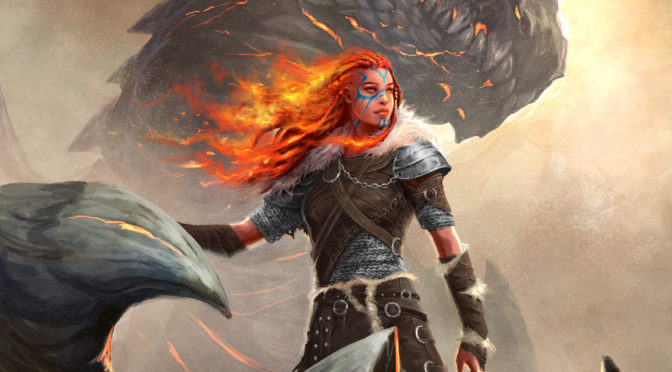
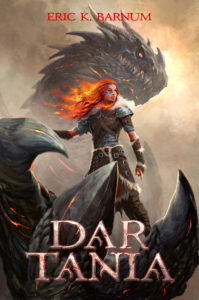
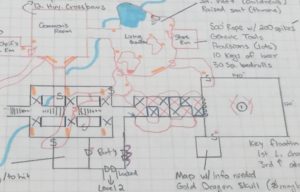
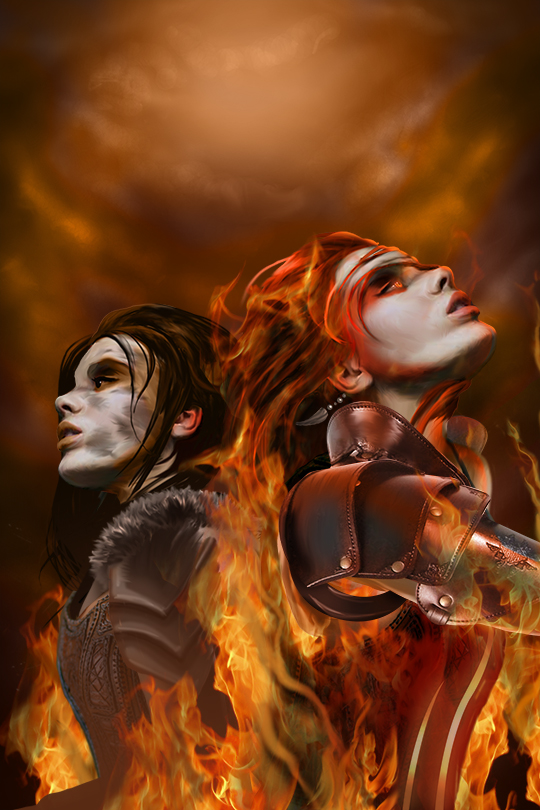
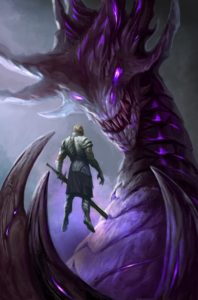

4 thoughts on “Interview with Eric K. Barnum”